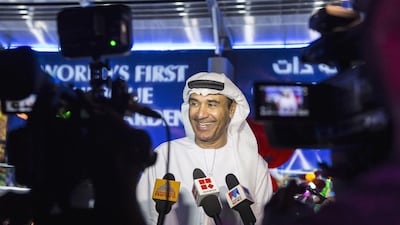Dubai Municipality is constructing a waste-to-energy plant in order to convert 1.82 million tonnes of solid waste per year into 171 megawatts of electricity.
The Dh2.5 billion waste recycling facility is expected to supply 120,000 households with electricity, said Municipality officials during a press conference on Monday.
“The construction work on the new project, called Waste-to-Energy, will begin within a few months and is expected to become operational before Expo 2020,” said Hussain Nasser Lootah, director general of Dubai Municipality.
“A total of 120,000 homes are expected to be powered by electricity produced from the waste-to-energy plant” said Mr Lootah, adding that around 8,000 tonnes of household waste are being collected on a daily basis in Dubai.
Dubai Municipality is launching the project in cooperation with Dubai Electricity and Water Authority (Dewa).
"Electricity produced from waste will be sent directly to Dewa. Thus, both parties will benefit from the facility," Mr Lootah told The National.
“Waste is one of the greatest challenges for future generations. Recycling and projects to convert waste in a sustainable manner are essential.
“The plant will be designed to treat the city’s solid, industrial and commercial waste. It will simultaneously recover the energy and treat gases generated as a result of incineration.”
The project is in line with Dubai’s strategy to provide 75 per cent of Dubai’s total power output from clean energy sources in 2025. The municipality signed agreements with Hitachi Zosen Inova and Besix Group to deliver the project.
_______________
Read more:
UAE needs 'toxicity tax' on high polluting vehicles, industry head say
Thousands of UAE residents to use public transport on Car Free Day next month
Plastic pollution is already a big problem. This year it just got bigger
_______________
The move is just one of several strategies to reduce waste, Mr Lootah said. Among them are plans to remove rubbish bins and replace them with recycling bins and Dubai Safari has been built on a site that was once one of the largest landfills in the city.
“We are working on a series of measures to enable waste, especially household waste, to be harnessed as a valuable resource to provide energy, reduce landfills and have the smallest carbon footprint in the world by 2050,” said Mr Lootah.
Abdul Majeed Sifai, director of Dubai Municipality's waste management department, said the waste-to-energy project is considered to be one of the largests in the world.
“Other countries have developed similar projects; however, smaller quantities of waste were being transformed into energy source. The waste-to-energy plant will be transforming 5,000 tonnes of waste per day.”

